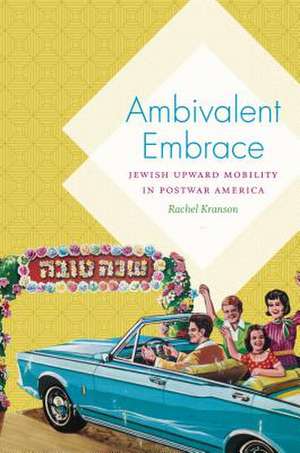Ambivalent Embrace
Autor Rachel Kransonen Limba Engleză Paperback – 6 noi 2017
Kranson reveals that many Jews were deeply concerned that their lives--affected by rapidly changing political pressures, gender roles, and religious practices--were becoming dangerously disconnected from authentic Jewish values. She uncovers how Jewish leaders delivered jeremiads that warned affluent Jews of hypocrisy and associated "good" Jews with poverty, even at times romanticizing life in America's immigrant slums and Europe's impoverished shtetls. Jewish leaders, while not trying to hinder economic development, thus cemented an ongoing identification with the Jewish heritage of poverty and marginality as a crucial element in an American Jewish ethos.
| Toate formatele și edițiile | Preț | Express |
|---|---|---|
| Paperback (1) | 216.08 lei 6-8 săpt. | |
| The University of North Carolina Press – 6 noi 2017 | 216.08 lei 6-8 săpt. | |
| Hardback (1) | 584.92 lei 6-8 săpt. | |
| The University of North Carolina Press – 6 noi 2017 | 584.92 lei 6-8 săpt. |
Preț: 216.08 lei
Nou
Puncte Express: 324
Preț estimativ în valută:
41.35€ • 44.21$ • 34.47£
41.35€ • 44.21$ • 34.47£
Carte tipărită la comandă
Livrare economică 17 aprilie-01 mai
Preluare comenzi: 021 569.72.76
Specificații
ISBN-13: 9781469635439
ISBN-10: 1469635437
Pagini: 234
Dimensiuni: 156 x 234 x 14 mm
Greutate: 0.41 kg
Editura: The University of North Carolina Press
ISBN-10: 1469635437
Pagini: 234
Dimensiuni: 156 x 234 x 14 mm
Greutate: 0.41 kg
Editura: The University of North Carolina Press
Notă biografică
Rachel Kranson is assistant professor of religious studies at the University of Pittsburgh.
Descriere
This new cultural history of Jewish life and identity in the United States after World War II focuses on the process of upward mobility. Rachel Kranson challenges the common notion that most American Jews unambivalently celebrated their generally strong growth in economic status and social acceptance during the booming postwar era.
